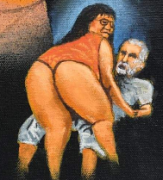|
As an American whose knowledge of Thatcher extends to, "Everyone in Britain hates her," this thread is really informative and interesting. Thanks OP for making it and thanks BalloonFish (and everyone else) for the really informative and awesome posts.
|
|
|
|

|
| # ? Apr 25, 2024 01:17 |
|
Solumin posted:As an American whose knowledge of Thatcher extends to, "Everyone in Britain hates her," this thread is really informative and interesting. Thanks OP for making it and thanks BalloonFish (and everyone else) for the really informative and awesome posts. If you want to know why everyone in the UK hates Thatcher someone will have to do effortposts on the Miner's strike and the Poll Tax.
|
|
|
|
jabby posted:If you want to know why everyone in the UK hates Thatcher someone will have to do effortposts on the Miner's strike and the Poll Tax. Yeah, this. While I'm glad people are enjoying my Tales of Woe From The Car Factories posts, it's not really telling the whole story (although the OP did ask specifically about the UK pre-Thatcher). The car industry imploded long before Mrs Thatcher was in power and, unlike virtually every other manufacturing industry, was almost inarguably in a better state when she left office than when she started. If every industry had been reformed and modernised like the car industry Mrs. T almost certainly wouldn't be reviled across such swathes of the country (for 'swathes' read 'pretty much everywhere outside bits of London and southern England'). As it happens the Tories are generally pretty well disposed to the car industry - the car represents personal freedom and consumerism rather than grubby socialised transport like trains or buses - and it got off pretty lightly. And even then it shed tens of thousands of jobs and closed a dozen or so factories. The traditional heavy industries, especially coal, steel and shipbuilding, were completely gutted beyond any pretense of just pruning away the dead wood, and was done with virtually zero thought for what would happen to the people and places that depended on them for their existence. These were changes driven by ideology rather than just the pressing need to fix a bad situation. Just because I'm churning out examples of how completely dysfunctional much of the British economy was before 1979 shouldn't be taken as support for what Mrs T did in the years afterwards. I can absolutely understand where the hate comes from for many.
|
|
|
|
BalloonFish posted:Germany is very big on worker representation, and has been since it was rebuilt after WW2. As I understand it union membership is mandatory in many German industries and every German company over a certain size has to have a proportion of union representatives on its board. A lot of the German federal states have shares in big regional employers, too. Basically Germany runs something similar to the pre-1979 Postwar Consensus in the UK only it actually works. Didn't know that Germany was that left wing when it came to worker representation. I always saw Germany as the number two most right wing modern European country after U.K.
|
|
|
|
punk rebel ecks posted:Didn't know that Germany was that left wing when it came to worker representation. I always saw Germany as the number two most right wing modern European country after U.K. Germany has some of the strongest workers rights in Europe. Up until recently they didn't even have a formal minimum wage because the unions did such a good job of negotiating wages for their members.
|
|
|
|
punk rebel ecks posted:Didn't know that Germany was that left wing when it came to worker representation. I always saw Germany as the number two most right wing modern European country after U.K. Ooh you would enjoy a history of the post-WW2 Germany scene. One of the few countries to have a militant left of note. Heck, check out the Wikipedia page on the Rote Army Fraktion / Red Army Fraction.
|
|
|
|
You'd think Germany would be very anti-left due to the whole East Germany being Communist thing.
|
|
|
|
punk rebel ecks posted:You'd think Germany would be very anti-left due to the whole East Germany being Communist thing. The former East Germany regions are actually the strongest voting bloc for Die Linke (lit: 'The Left') in terms of political parties. The rest of the country are stronger on Merkel's Christian Democratic Union & friends coalition.
|
|
|
|
Tesseraction posted:The former East Germany regions are actually the strongest voting bloc for Die Linke (lit: 'The Left') in terms of political parties. The rest of the country are stronger on Merkel's Christian Democratic Union & friends coalition. I thought East Germany hated Communism?
|
|
|
|
punk rebel ecks posted:I thought East Germany hated Communism? Just the bad parts of it, duh!
|
|
|
|
punk rebel ecks posted:Didn't know that Germany was that left wing when it came to worker representation. I always saw Germany as the number two most right wing modern European country after U.K. Ignoring their wacky Bavarian splinter group, the German conservative party CDU is to the left of UK Labour, being largely pro-immigrant, raising taxes, agreeing to implement the minimum wage now that unions aren't that strong anymore, cutting the military budget to nothing until Russia invaded Ukraine, etc. The only conservative policies left are balancing the budget with austerity (but now they're just cheating by spending more money anyway and claiming the budget is balanced due to an unexpected tax windfall) and refusing to slap the term "marriage" onto gay marriage. The social democrats are hemorrhaging votes because the CDU has basically implemented all the main social democrat policies so now there's nothing for them to campaign on. There's a state government led by the left and after recent state elections there'll probably another one led by greens (gently caress our greens they're dumb). Due to there being no classical right wing party there's now a zoo of far right protest parties siphoning up maybe 15% of the vote but nobody wants to enter a coalition with them and everyone ignores their delegates in parliament. The really far right countries in Europe are mostly in the East.
|
|
|
|
blowfish posted:Ignoring their wacky Bavarian splinter group, the German conservative party CDU is to the left of UK Labour, being largely pro-immigrant, raising taxes, agreeing to implement the minimum wage now that unions aren't that strong anymore, cutting the military budget to nothing until Russia invaded Ukraine, etc. The only conservative policies left are balancing the budget with austerity (but now they're just cheating by spending more money anyway and claiming the budget is balanced due to an unexpected tax windfall) and refusing to slap the term "marriage" onto gay marriage. Bismarckism strikes again.
|
|
|
|
ALL-PRO SEXMAN posted:Bismarckism strikes again.
|
|
|
|
punk rebel ecks posted:I thought East Germany hated Communism? Voting for a left-of-center political party actually means you want to bring back Soviet-style Communism. Got it. 
|
|
|
|
Comrade Koba posted:Voting for a left-of-center political party actually means you want to bring back Soviet-style Communism. Got it. SPD is centre left.
|
|
|
|
Tesseraction posted:Ooh you would enjoy a history of the post-WW2 Germany scene. One of the few countries to have a militant left of note. Heck, check out the Wikipedia page on the Rote Army Fraktion / Red Army Fraction. The RAF were hardly left wing. As pretty accurately summed up by a Not the Nine O'clock News sketch of the time, they were what happens when a couple of sociopathic fanatics convince young people that direct action - by which we mean "killing people you don't like" - is just as valid a route to becoming a socialist as actually studying Marxist theory. Communism wasn't the reason for the RAF, it was the excuse.
|
|
|
|
blowfish posted:
That still makes them left of centre.
|
|
|
|
blowfish posted:The really far right countries in Europe are mostly in the East.
|
|
|
|
Jedit posted:The RAF were hardly left wing. As pretty accurately summed up by a Not the Nine O'clock News sketch of the time, they were what happens when a couple of sociopathic fanatics convince young people that direct action - by which we mean "killing people you don't like" - is just as valid a route to becoming a socialist as actually studying Marxist theory. Communism wasn't the reason for the RAF, it was the excuse. True enough, and I do love that sketch. It was very much a naïve anti-establishment mentality that preyed on people upset with the status quo. punk rebel ecks posted:I thought East Germany hated Communism? East Germany also required them to read about left-wing political thought, so while they saw the problems of the Soviet Union's policies, they also could see how it was different from what left-wing intellectuals had written about. Similarly Zizek was born and raised in Communist Yugoslavia and was told his writings were not sufficiently Marxist to be valid, yet here in the west he's considered an orthodox Marxist theorist (and rather unreadable, in my opinion).
|
|
|
|
Tesseraction posted:East Germany also required them to read about left-wing political thought, so while they saw the problems of the Soviet Union's policies, they also could see how it was different from what left-wing intellectuals had written about. Similarly Zizek was born and raised in Communist Yugoslavia and was told his writings were not sufficiently Marxist to be valid, yet here in the west he's considered an orthodox Marxist theorist (and rather unreadable, in my opinion). I was under the impression that Yugoslavia was different from the other Sovient occupied countries and is where Communism somewhat worked.
|
|
|
|
From the previous page quote:He couldn't start the privatisation process as it hadn't been in the Conservative manifesto in 1987, so it was put in for the 1992 election which he also somehow won. I'm an American and I don't know what the gently caress he's talking about. Do party manifestos mean something in Britain? In the US, the party platforms are entirely symbolic.
|
|
|
|
HalPhilipWalker posted:From the previous page Broadly, yeah, the British public take party manifestos at face value. The voters will likely remember if there were big manifesto pledges that you don't go through with. Except in Scotland where the SNP were able to get away with promising to replace Council Tax with a less regressive system & then promptly spending the next 9 years just freezing Council Tax increases. But there are usually articles at the end of a Parliament showing how the government did against their promises before the last election. And people read them, & nod or shake their head. That said, governments do things that weren't mentioned in the manifesto & it's not that big a deal: the bigger issue is promising something & then failing to deliver. Which is why manifestos end up filled with nonsense like "we'll ensure the 2012 Olympics are good".
|
|
|
|
punk rebel ecks posted:I was under the impression that Yugoslavia was different from the other Sovient occupied countries and is where Communism somewhat worked. To some extent, yes. Primarily because Tito was happy to work with the west, so didn't suffer the same economic deprivation of the greater Soviet bloc. HalPhilipWalker posted:From the previous page To add to what forkboy84 said, it's worth mentioning that in the United Kingdom our Upper House can block legislation indefinitely, much like the Senate in the United States, but the Parliament Acts added in a caveat that something in a party's General Election Manifesto has the right to overrule a Lords' vote. This is why, for instance, Tony Blair managed to implement a ban on fox hunting despite the Lords voting it down every time it came through to them. Of course, in practice the ban hasn't changed anything, it just means hunting saboteurs have a legal leg to stand on. It hasn't actually stopped rich people from hunting foxes because, well, they're rich. The law doesn't apply to them.
|
|
|
|
Tesseraction posted:To some extent, yes. Primarily because Tito was happy to work with the west, so didn't suffer the same economic deprivation of the greater Soviet bloc. It also bans one specific type of fox hunting, so anyone who just gets a license and shoots his shotgun at foxes can continue to do so.
|
|
|
|
Tesseraction posted:To add to what forkboy84 said, it's worth mentioning that in the United Kingdom our Upper House can block legislation indefinitely, much like the Senate in the United States Nope, the Lords aren't nearly that powerful and haven't been for more than a century. They can block legislation for up to one year (except the budget and then it's only a month). There's nothing in the legislation per se about special cases for legislation in a party's manifesto (the very concept of a political party isn't really a formal part of our constitution, after all), but it's a convention that the Lords not oppose such legislation because they would be explicitly defying the will of the people (who, by giving the governing party a majority despite knowing explicitly the party was going to enact this legislation, presumably approve of it). Thank goodness, by the way; otherwise you could see the sort of deadlocks that the House of Representatives and the Senate get into from time to time. It's an embarrassment for the government if the Lords votes down their legislation because generally that only happens if the government is doing something really dumb, but if the government wants it enacted badly enough, it'll get done. As for manifesto promises - the Liberal Democrats had in their manifesto a pledge to abolish tuition fees, then standing at 3000 pounds ($5000) a year. The instant they got into government with the Tories they instead agreed to triple them to 9000/$14000. In the 2015 election they went from having 57 seats to 8 and that broken promise was one big reason for that; people remembered. There's a reason some UK goon splashed out on 
feedmegin fucked around with this message at 12:23 on Mar 29, 2016 |
|
|
|
Tesseraction posted:To add to what forkboy84 said, it's worth mentioning that in the United Kingdom our Upper House can block legislation indefinitely, much like the Senate in the United States, but the Parliament Acts added in a caveat that something in a party's General Election Manifesto has the right to overrule a Lords' vote. This is why, for instance, Tony Blair managed to implement a ban on fox hunting despite the Lords voting it down every time it came through to them. This is not quite right, you're crunching together two separate concepts here. The Parliament Acts mean that the House of Lords can only delay any primary legislation by one year (originally two), or a money bill by one month. Doesn't matter whether or not the bill was in the manifesto; if the Commons passes it enough times and the government is prepared to wait a year, it goes to the Queen for Royal Assent. The original two-year delay (and the general lack of a strong government that would have been prepared to do something controversial enough to use it) was such a deterrent to trying that eventually after the Second World War the government passed another act (using the powers of the original act, almost the only thing it was ever used for) to reduce it to one. There's also something called the Salisbury convention, which was thought up by the Conservative peer Lord Salisbury after the 1945 election to preserve the House of Lords' existence/prevent a socialist revolution. The Tories, as you might expect, had a gigantic majority in the House of Lords (it was still made up of hereditary, not life peers), and although the original Parliament Act was in force, this meant that they could have spent a lot of the next five years blocking Labour's welfare state legislation, which they had an overwhelming popular mandate to enact. Salisbury therefore declared that the House of Lords would not vote down any bill that was enacting a manifesto promise, and every House of Lords after that has sensibly agreed to do the same thing. The thing with the Hunting Act is constitutionally very interesting since, despite the government having spent four years dancing up and down with a neon sign reading "HEY WE REALLY WANT TO BAN FOX HUNTING", this is what the 2001 manifesto said (tw Blairism): quote:The House of Commons elected in 1997 made clear its wish to ban fox-hunting. The House of Lords took a different view (and reform has been blocked). Such issues are rightly a matter for a free vote and we will give the new House of Commons an early opportunity to express its view. We will then enable Parliament to reach a conclusion on this issue. If the issue continues to be blocked we will look at how the disagreement can be resolved. We have no intention whatsoever of placing restrictions on the sports of angling and shooting. That second sentence is a masterpiece of disingenuousness; it wasn't nearly as simple as that. Anyway, you will note that the manifesto does not say, in as many words, "We want to ban fox-hunting". (A free vote, after all, implies that the Government's own MPs may vote the measure down, so clearly they can't be that committed to it...) It does everything possible to imply it, but didn't actually say it. (The 1997 manifesto used similar wording, "We want a free vote", not "We want to ban hunting".) Based on that, the Tory peers then (not unreasonably) decided that banning fox-hunting was not an explicit manifesto promise and that the Salisbury convention didn't apply. After a load more bullshit the Government used the Parliament Act 1949 to get the latest Hunting Bill to the Queen, and then the Countryside Alliance very helpfully made a legal challenge (on the grounds that it was unfair that the 1949 act was only passed by using the 1911 act to force it through) which gave us a firm legal opinion that the 1949 act is legitimate.
|
|
|
|
HalPhilipWalker posted:From the previous page EDIT: this became a bit of an effortpost in Thatchers downfall and more specifically how John Major somehow became Prime Minister... Other posters have explained that in British politics a manifesto is perhaps taken a bit more seriously than in the US but that wasn't quite what I was getting at. The UK is split into 650 constituencies of more or less equal population size. When we go out to vote we vote for the person we want to be our Member of Parliament (MP) for our constituency. Most of the time that person is a member of a political party so once everyones been elected we can see which party has the most MPs. The leader of that party (or at least the leader who can form a coalition of 50%+1 of the MPs in the House) then becomes Prime Minister. Some people vote for the person they want to be MP, some people put their X next to the person who represents the party they want to vote for. This also means that since the Prime Minister is an MP he or she has to stand for election in a constituency, meaning they can theoretically not even be elected to Parliament, stopping them from even become Prime Minister (although if this looks likely the party would shuffle things round and put him somewhere he can't possibly lose - they've done this with senior ministers a few times in living memory). However this isn't the only way a party leader can become Prime Minister. If a party decides they don't like their leader/Prime Minister (who is obviously the same person) someone can mount a leadership challenge within the party and if they gain enough support of their fellow MPs and/or general party members (the rules differ per party; this is a purely party based thing, nothing to do with a general election) then it goes to a vote and the winner becomes party leader. And if the party leader was Prime Minister, then they vacate that office as well and the winner gets it. This is what happened with John Major. Thatcher was becoming very unpopular within her own party and a guy called Sir Anthony Meyer made a "stalking horse" bid for the party leadership. This is a bid when a person makes a leadership challenge without expecting to win, but by opening a leadership challenge the person who actually wants to challenge can do so without the controversy of making the original challenge (try and keep up  ). However, nobody did, and Meyer was resoundingly beaten. ). However, nobody did, and Meyer was resoundingly beaten.A year later in 1990 Sir Geoffery Howe, previously the Foreign Secretary (I think he was Deputy Prime Minister at this point; which paradoxically is a fringe position in the British cabinet) tendered his resignation over some complicated issues relating to the Exchange Rate Mechanism and made a blistering attack on Thatcher in the House of Commons. A pretty well known MP called Michael Hesseltine challenged her for the leadership, and when it went to a vote she gained 204 of 372 votes, which was an overall majority but not the 55% she needed to prevent the vote going to a second ballot. Thatcher then went round her allies in the party and asked if they thought she could win. Some said she could, some said she couldn't. Rather than face losing the premiership through an internal party ballot she "withdrew her candidacy" which is a very neat political way of resigning without actually having to bother resigning. Hesseltine would have run unopposed so two more MPs announced they would run - Douglas Hurd, a centre-right candidate and who had been Thatchers Home Secratary, one of the most senior positions in the cabinet - and John Major, also a moderate centre-right candidate who was Chancellor of the Exchequer which is generally seen as the best job apart from PM (but not necessarily the best grounding to become PM). Now it's important to remember that these votes were being done by Conservative MPs and they were technically secret ballots; but each candidate is "selected" by their party members in their constituency before they can run to become an MP, and they can deselect them as well, so in reality the MPs were listening to the party members in their constituency. The word on the street was that Hesseltine was unpopular with the grass roots because he'd embarassed Thatcher over The Westland Affair and resigned because of it, and it would have looked daft making someone Prime Minister if they weren't even currently in the cabinet. Plus, they thought he was a bit of a oval office. The grassroots worried that Hurd, although a popular politician and Home Secretary, was too much of a posho wanker for the people of Britain to actually elect him as Prime Minister which meant it had to be Major. In the second ballot Major won 50% of the vote to Hesseltines 35% and posho wanker Hurds 15%. This is where it gets really interesting because it now should have gone to a third ballot as again Major (according to party rules) has to get 55% of a vote to win. So Hurd should have been eliminated and it should have gone to a straight Major-Hesseltine vote; instead there were lots of shady political deals going on until someone basically told Hesseltine that nobody would be supporting him as Prime Minister so he might as well just give up. So he withdrew his candidacy, followed shortly by Hurd, and that is how a quiet grey man whose best quality was "nobody knows if he's a twat yet" became Prime Minister of a country with nuclear weapons by getting 49.7% of an internal party vote. ANYWAY - the last General Election before this had been in 1987 and rules at the time said that the PM could call one between every 4-5 years. Obviously he wasn't going to call one until 1992 because he wasn't entirely sure he could actually win it; he'd already catapulted Hesseltine and Hurd straight into the cabinet (those shady deals, remember?) in an attempt to get as much of the parties support as possible. But in the 16 months between being "elected" (lol) Prime Minister and the 1992 General Election he was pretty much powerless to do anything, because people had voted in the Conservative party when Thatcher was in charge of it and he couldn't then start doing his own thing (and since 50% of his MPs hadn't actually voted for him he'd have struggled to even get them to support it). It would be like him coming out of 10 Downing Street and saying to the press, "Look, sorry guys, I know everyone voted for Thatchers lot in 1987, but we've just had our own little vote that we didn't tell you about. Anyway I'm PM now and I'll do it my way". Although there's nothing illegal about that the opposition parties would have had a field day with it (not to mention the press). That's what I mean when I said "it wasn't in his manifesto". But then in April 1992 John Major somehow managed to win the General Election and become a proper actually elected Prime Minister and could do what he wanted. It took him about fifteen minutes to gently caress it all up. Phew, effortpost!
|
|
|
|
punk rebel ecks posted:You'd think Germany would be very anti-left due to the whole East Germany being Communist thing. Nah, it was specifically the other way round. After the war, what became West Germany in 1949 realised that it was in a direct contest of ideologies with its eastern counterpart. The founders of the FRG weren't dumb, they knew that naked Capitalism wouldn't work as a system; when they wanted to win that "contest" they had to lay the ground for a country which was better to live in than the East. The concept of the welfare state as well as organised labour had a long and honoured tradition in Germany as well, and finally many of the founders were devout Catholics who were socially rather conservative, but greatly influenced by Catholic economic teaching which basically said/says that giving the markets free reign doesn't work, that workers should be fairly compensated and that the benefit of many trumps the benefit of the few (the 1931 papal encyclica Quadragesimo anno was especially important for Catholic thinkers and politicians during that time). This even led to things like the 1947 party platform of the CDU stating that The Ahlen mainfesto posted:The capitalist system of economy hasn't satisfied the public and social needs in life of the German people. After the terrible political, economic and social collapse which was the result of criminal power politics, a complete restructuring of the social order is needed. The goal of this restructuring can't be the capitalist drive to profit and power, but only the welfare of our people. Based on a common order of society, the German people shall receive a economic and social constitution which satisfies the rights and the dignitiy of man, serves the spiritual and material rebuilding of our people and secures peace within and outside of our borders. While the left wing of the CDU which was responsible for the manifesto ultimately didn't prevail, many of their demands were at least partially met by the 1949 constitution, especially in the second paragraph of article 14 which simply states: "Property entails obligations. Its use shall also serve the public good." (which in a similar form already had been in the 1919 constitution of the Weimar Republic) Jedit posted:The RAF were hardly left wing. As pretty accurately summed up by a Not the Nine O'clock News sketch of the time, they were what happens when a couple of sociopathic fanatics convince young people that direct action - by which we mean "killing people you don't like" - is just as valid a route to becoming a socialist as actually studying Marxist theory. Communism wasn't the reason for the RAF, it was the excuse. While there is no direct path communism->RAF of course, the history behind that is a bit more complicated. Even though the Allies did a comparatively good job with de-nazifying Germany after the war (at least when compared with Austria and similar attempts in Japan or Italy), the German governments of the 1950s and 60s still relied heavily on former NSDAP members or otherwise people who had worked for the Nazi regime before in some way - not too surprisingly, seeing as a 100% denazification would have limited the pool of potential civil servants and politicans to a relatively small number of former dissidents and resistance fighters as well as severely disrupting the governmental and official continuity - in a situation as difficult as post-1945 you want to be able to rely on people who are experienced and know what they're doing, after all. Also there was a growing desire within Germany to move on from the past and not "rock the boat", as it were. Enter the generation of men and women born in the late stages of the Third Reich or even after the war. They rightly see themselves as in no way complicit with what had happened, are horrified at what the generation of their parents had done, are full of the zeal of youth to create a better world with new politics and ideas, look toward an Eastern bloc which appears to fulfill just that promise and find themselves to be citizens of a state which still admits former Nazis to the highest offices - Hans Globke (director of the Federal Chancellery under Adenauer who was instrumental in formulating and enacting the Nuremberg Laws directed against Jews), Heinrich Lübke (Federal President 1959-69 who had been a supervisor on a military faciliy where he had repeatedly used concentration camp prisoners for forced labour), Hans Filbinger (prime minister of Baden-Württemberg 1966-78, military judge who had sentenced at least four deserters to death, though that admittedly only became public in 1978), Kurt Georg Kiesinger (chancellor 1966-69, former NSDAP member) or Fritz Ries (powerful industrialist with close ties to conservative politicians who had used thousands of camp prisoners as forced labour in his factories) were just the tip of the iceberg. The (re-)establishment of a German military in 1955 and the question of nuclear armament resulted in furious resistance of the pacifist movement, which had grown strongly in numbers after the war and during the early Cold War. In 1962, the Adenauer government tried to suppress the SPIEGEL magazine after an article criticising the preparedness of the military in case of a Soviet attack: citing the publication of classified material (which turned out to be bullshit) the minister of defence Franz Josef Strauß ordered the arrest of several journalists and the searching of the magazine offices (which was super illegal for him to do). Even though the public uproar was massive and Strauß was quickly forced to resign, it isn't too strange that many left-wing students believed to see the republican and democratic facade of the new German state crumbling away, exposing the ugly old authoritarianism which already had led to two world wars,. They weren't completely wrong about that, either. The young left, which was mainly comprised of university students, also benefitted from a massive swell in students numbers during the 60s and especially from the particular status of West Berlin, which was legally speaking not a part of West Germany at all. Conscription laws didn't apply there, and so tens of thousands of students refusing to enter the German military moved and congregated there, forming a fertile ground for student opposition to the conservative government of the time. Soviet influence and propaganda also led to a quickly growing anti-Americanism within the political left, which was only fuelled by the beginning of the Vietnam War in 1964 (which can't be understated in its importance for the radicalisation of the left) or the CIA-backed coup d'état deposing a democratically elected Iranian prime minister in 1953. In 1967, things came to a head when the Iranian shah (many would say: dictator) visited Berlin. The government wanted to keep up the facade of order at all costs during the visit and therefore had no problem giving Iranian secret agents free reign to deliver heavy beatdowns to students protesting the shah, while the police watched and did nothing. One student named Benno Ohnesorg was killed by a police officer (who curiously later turned out to be secretly working for East German intelligence, even though it's unclear whether this had anything to do with Ohnesorg's death) during the protests, and a prominent student leader named Rudi Dutschke was shot and nearly killed by a fanatic the following year. Many people active in left-wing politics were horrified and saw this as the beginning of a brutal persecution of dissidents by the state. The emergency laws which had been enacted in 1968 put more fuel into the fire; many thought that the recreation of the 1933 regime was imminent and decided to move from passive to active resistance. By 1969 a not too small number of students and other activists had decided to adopt violence as a means of what they saw as self-defence. Partly they were also influenced by maoist teaching of the use of violence in order to speed up the road to a communist revolution; other influences were guerilla groups like the Shining Path in Peru, the ELN in Bolivia or the FARC in Colombia, and the armed fight of socialist or communist Palestinian groups against Israel and "the West". East German intelligence also tacitly lend them their support. You have to see the first generation of the RAF in front of this background. They genuinely believed that a) the state was out to get them and b) that any peaceful attempts to institute socialism had been proven to be dead ends and that the use of violence against the capitalist oppressors was what was needed to incite the masses. This also explains why the RAF could always count on massive support networks of thousands of left-wing activists, at least during the first few years of its existence. Many believed them to be the vanguard of a socialist uprising in Germany. A bumbling, inept and heavy-handed response of government and police and a knack of the first generation for effective propaganda cemented this public image of the RAF. Thousands of people attended the funeral of RAF member Holger Meins (who had died as a result of a hunger strike he had begun to protest against what he claimed were inhumane circumstances of his incarceration), and tens of thousands protested on the streets, and it was only when the second generation of the RAF (which had formed out of the desire to get the first generation out of prison) showed that they had no qualms about killing innocent bystanders that leftist support started to disappear. This way way too long a reply to something which you probably knew anyway, so sorry that I kinda got carried away here  But yeah, the RAF wasn't just a number of nutjobs out for blood, they were the direct consequence of a radicalised left and a conservative state (although it's interesting to see that the peak of RAF terrorist activity happened during the social democratic government 1969-82) within the framework of the Cold War, in which Germany was the frontline. But yeah, the RAF wasn't just a number of nutjobs out for blood, they were the direct consequence of a radicalised left and a conservative state (although it's interesting to see that the peak of RAF terrorist activity happened during the social democratic government 1969-82) within the framework of the Cold War, in which Germany was the frontline.In this context I should probably add that a couple of months ago there was a failed attempt of three people to rob a money transport - later DNA analysis showed that they were indeed former members of the third and last generation of the RAF (which dissolved itself in 1998). They're still at large and probably need the money to keep up their life in the underground. One of the last RAF fighters also ended up in Baghdad, where she and her husband vanished after the American invasion in 2003. I wonder if there's a former RAF terrorist living under ISIS rule now (probably not).
|
|
|
|
System Metternich posted:Interesting stuff about Germany Thanks for this great post! I've always wondered exactly how/why the German socio-economic model came about and why that country, seemingly uniquely, has managed to make some sort of left/right wing compromise work. Really appreciate the effort.
|
|
|
|
Tesseraction posted:True enough, and I do love that sketch. It was very much a naïve anti-establishment mentality that preyed on people upset with the status quo. I dug it out now I'm not phone posting: https://www.youtube.com/watch?v=iDJeTnLKLEI
|
|
|
|
A freely available online satirical
|
|
|
|
I did not expect this thread to turn out nearly this interesting, so thanks to the effort posters who have made it so!
|
|
|
|
jyrka posted:It's from a 'bit' by a popular leftist comedian Stewart Lee. It's as unfunny as it sounds. What absolute bollocks. I'll assume this is a piss-take for the time being. Blimey.
|
|
|
|

|
| # ? Apr 25, 2024 01:17 |
|
english muffin posted:She didn't steal mine. I went to private school. She didn't steal mine either. I went to a state school in South Tyneside. Some local authorities decided that it was worth paying for and carried on doing it. Particularly in places with high deprivation and unemployment.
|
|
|













 I CANNOT EJACULATE WITHOUT SEEING NATIVE AMERICANS BRUTALISED!
I CANNOT EJACULATE WITHOUT SEEING NATIVE AMERICANS BRUTALISED!















